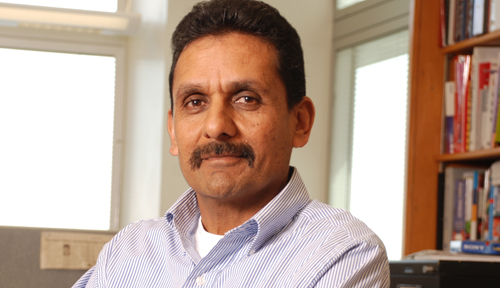Last month, Kaushik Patel, Ph.D., was announced as the inaugural A. Ross McIntyre M.D., Ph.D., Professor.
The professorship was created by Donald McIntyre, M.D., in honor of his father, Dr. A. Ross McIntyre, the chairman of the department of physiology and pharmacology at UNMC from 1935 to 1967.
Dr. Patel offered these thoughts on the appointment:
What does it mean to be the inaugural holder of the A. Ross McIntyre Professorship?
I am both humbled and honored to hold this professorship. We hope to honor Dr. McIntyre’s memory by continuing to do high quality, innovative research in our laboratory. Such generous support and philanthropy are critical for research today.
Please describe your research and the contributions it has made to the field.
For the past 26 years, research in my laboratory has focused on the neural control of cardiovascular and renal function in health and disease states. We are studying various aspects of the autonomic outflow and fluid balance regulation in normal and disease states such as heart failure and diabetes. Biochemical, molecular biology, electrophysiological, hemodynamic and renal function measurement techniques are used for studying the various components of autonomic outflow and fluid balance regulation, particularly with regard to a specifically critical area in the hypothalamus called the paraventricular nucleus.
This area is the master relay switch, so to speak, for autonomic function in the body. Our work has uncovered the critical role that this area plays in the regulation of autonomic function in normal and disease states. The studies in our laboratory are providing important new insights about the normal neural regulation and its consequences in various disease states. In addition, we are examining the underlying mechanism that are involved and the therapeutic effect of exercise training in these disease states.
How will the professorship help you expand focus or achieve your research and teaching goals?
This will enable us to pursue some riskier pilot projects and provide emergency funds to keep up the ongoing extramural funding to the laboratory. An important component of the work in the laboratory is by the trainees, and this professorship also could be used to support this mission.

Congratulations, Dr. Patel. – Vishwa (Viswanathan Rajagopalan)